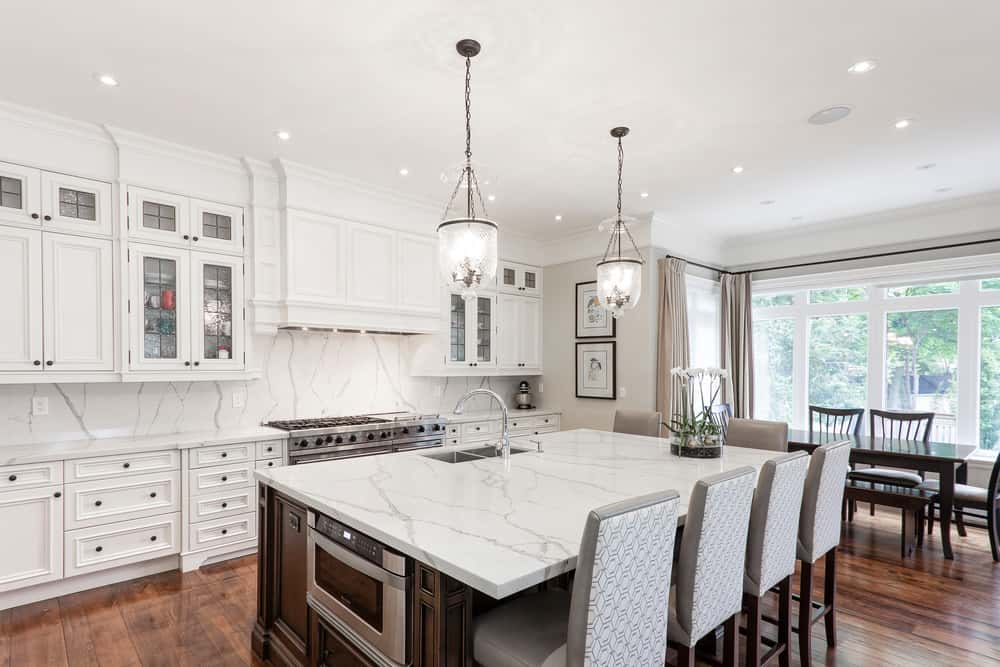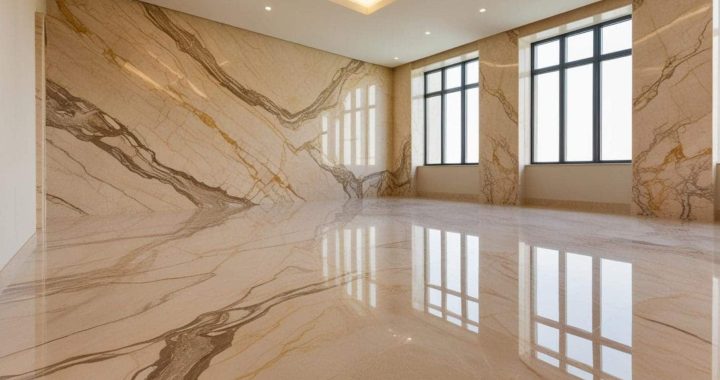The Ultimate Guide to Choosing Quartz Countertops

Key Takeaways:
- Quartz countertops offer numerous advantages, including strength, durability, and low maintenance.
- Quartz countertops are resistant to scratches, stains, heat, bacterial growth, and moisture damage.
- There is a wide variety of styles and designs available for quartz countertops.
- Factors to consider when choosing quartz countertops include the type of quartz, color, and pattern, and thickness and edge profiles.
- When finding a reputable supplier, research, compare, read reviews, and request samples.
- The installation process of quartz countertops involves measurement, cutting, preparation, installation, and finishing touches.
- To care for quartz countertops, regularly clean, wipe up spills promptly, use cutting boards and trivets, avoid excessive force, and seek professional advice if needed.
- Common issues with quartz countertops include surface dullness, chips or cracks, burn marks, and stains.
- By following proper care and maintenance guidelines, quartz countertops can last for years.
1. Why Quartz Countertops are the Best Choice for Your Home
When it comes to choosing the perfect countertop material for your home, quartz countertops stand out as the best choice. From their numerous advantages to their long-lasting durability and vast variety of styles and designs, quartz countertops offer unparalleled benefits for homeowners.
1.1 The Advantages of Quartz Countertops
One of the primary advantages of quartz countertops is their incredible strength and durability. Made from a combination of natural quartz minerals and resin binders, these countertops are resistant to scratches, stains, and heat. Unlike other countertop materials, quartz countertops do not require sealing, making them low maintenance and highly convenient for busy households.
Additionally, quartz countertops are non-porous, which means they are resistant to bacterial growth and moisture damage. This makes them ideal for use in kitchens and bathrooms, where spills and moisture are common. The non-porous nature of quartz countertops also ensures that they do not need frequent resealing, saving homeowners both time and money in the long run.
1.2 Long-lasting Durability of Quartz Countertops
Durability is a key factor to consider when investing in countertops for your home. Quartz countertops are known for their exceptional durability and longevity. The combination of natural quartz minerals and resin binders creates a surface that can withstand daily wear and tear without showing signs of damage. Whether you’re cutting vegetables, placing hot pots, or accidentally dropping heavy objects, quartz countertops can handle it all.
Unlike natural stone countertops, such as granite or marble, quartz countertops are engineered to be more durable and resistant to chips and cracks. This makes them an excellent choice for high-traffic areas and households with children or pets. With proper care and maintenance, your quartz countertops can last for decades, making them a worthwhile long-term investment.
1.3 The Variety of Styles and Designs Available for Quartz Countertops
One of the most appealing aspects of quartz countertops is the wide range of styles and designs available. Unlike natural stone countertops that have limited options, quartz countertops come in a vast variety of colors, patterns, and finishes. Whether you prefer a classic, minimalist look or a bold, vibrant statement piece, you can find a quartz countertop that suits your aesthetic preferences.
With advancements in technology, quartz manufacturers can replicate the look of natural stone, such as marble or granite, without the associated maintenance and cost. You can now enjoy the luxurious appearance of marble countertops without worrying about etching or staining. Quartz countertops also offer consistency in pattern and color, ensuring that your countertops look uniform and seamless.
2. Factors to Consider When Choosing Quartz Countertops
It is important to know how to choose quartz countertops. While quartz countertops offer a plethora of benefits, it’s essential to consider a few factors before making a final decision. By understanding the different types of quartz, selecting the right color and pattern, and assessing the thickness and edge profiles, you can ensure that your quartz countertops not only enhance the beauty of your home but also meet your functional needs.
2.1 Understanding the Different Types of Quartz
Quartz countertops come in various types, each with its own unique characteristics and properties. It’s important to understand these types to make an informed decision. Some popular types of quartz include:
- Veined Quartz: Known for its resemblance to natural stone, veined quartz features intricate patterns and veining that mimic marble or granite. This type of quartz adds a touch of elegance and sophistication to any space.
- Solid Color Quartz: If you prefer a clean and contemporary look, solid color quartz is an excellent choice. Available in a wide range of colors, this type of quartz allows you to create a sleek and uniform appearance in your kitchen or bathroom.
- Textured Quartz: For those who desire a more tactile and visually interesting surface, textured quartz is the perfect option. This type of quartz features raised patterns or textures that add depth and visual appeal to your countertops.
2.2 Selecting the Right Color and Pattern for Your Quartz Countertop
The color and pattern of your quartz countertop play a significant role in the overall aesthetic of your space. When selecting a color, consider the existing color scheme of your kitchen or bathroom. If you have neutral cabinets and walls, you can opt for a bold, vibrant quartz countertop to create a focal point. Alternatively, if you have colorful cabinets or backsplash, a neutral or subtle quartz countertop can provide balance.
Patterns in quartz countertops range from subtle and uniform to bold and dramatic. Veined quartz countertops can add drama and create a sense of movement in your space, while solid-color quartz countertops offer a clean, modern look. Consider the style and theme of your home and choose a pattern that complements your overall design.
2.3 Assessing the Thickness and Edge Profiles of Quartz Countertops
The thickness and edge profile of your quartz countertop not only affect its appearance but also its functionality. Quartz countertops are available in various thickness options, typically ranging from 1 centimeter to 3 centimeters. Thicker countertops provide a more substantial and luxurious look, while thinner countertops offer a sleek and contemporary feel. Consider your personal preferences and the overall style of your home when selecting the thickness of your quartz countertop.
Edge profiles can also enhance the look of your quartz countertop. From simple and straight edges to decorative and intricate profiles, there are numerous options to choose from. Beveled edges add a touch of elegance, while rounded edges provide a softer and safer alternative for households with children. Take the time to explore different edge profiles and choose one that suits your style and needs.
3. How to Find a Reputable Supplier for Quartz Countertops
Once you have a clear idea of the type, color, and design of your quartz countertop, it’s time to find a reputable supplier. Choosing a reliable supplier is crucial to ensure that you get high-quality quartz countertops and excellent customer service. Consider the following steps when searching for a supplier:
3.1 Researching and Comparing Different Quartz Suppliers
Start by researching and making a list of potential quartz suppliers in your area. Look for suppliers with a good reputation and extensive experience in the industry. Read customer reviews and testimonials to get an idea of the quality of their products and services. Compare prices, warranty options, and customer satisfaction ratings to narrow down your choices.
3.2 Reading Reviews and Testimonials from Previous Customers
Customer reviews and testimonials can provide valuable insights into the reliability and professionalism of a quartz supplier. Look for reviews on independent websites or social media platforms to get unbiased opinions. Pay attention to comments about the quality of the quartz countertops, the installation process, and the supplier’s after-sales support. A supplier with positive reviews and satisfied customers is more likely to deliver a great experience.
3.3 Requesting Samples and Getting Expert Advice from Suppliers
Before finalizing your decision, request samples from your shortlisted suppliers. This will allow you to see and feel the quality of the quartz countertops firsthand. Evaluate their color, pattern, and finish in different lighting conditions to ensure they meet your expectations. Additionally, take the opportunity to speak with the suppliers and get expert advice on maintenance, care, and any specific concerns you may have. A supplier who is knowledgeable and responsive can provide valuable guidance throughout your countertop selection process.
4. The Installation Process and Maintenance of Quartz Countertops
Once you have chosen your quartz countertops and found a reputable supplier, it’s time to focus on the installation process and long-term maintenance. Understanding the steps involved in installing quartz countertops, learning how to care for them properly, and troubleshooting common issues will ensure that your countertops remain in excellent condition for years to come.
4.1 Understanding the Steps Involved in Installing Quartz Countertops
Installing quartz countertops is a complex process that requires precision and expertise. It typically involves the following steps:
- Measurement and Templating: A professional installer will visit your home to take accurate measurements of your cabinets and create a template for your countertops.
- Cutting and Fabrication: The quartz slabs are cut and fabricated according to the measurements and templates prepared earlier. This process involves shaping the countertops, cutting holes for sinks and appliances, and polishing the edges.
- Preparation: The cabinets are thoroughly cleaned and leveled to ensure a perfect fit for the quartz countertops.
- Installation: The quartz countertops are carefully placed on the cabinets and secured with adhesive. The seams between multiple slabs are sealed to create a seamless and cohesive look.
- Finishing Touches: The installer will make final adjustments, perform any necessary touch-ups, and clean the countertops to ensure they are ready for use.
4.2 Tips for Caring and Maintaining Your Quartz Countertops
To keep your quartz countertops looking their best, it’s important to follow proper care and maintenance guidelines. Here are some tips to ensure the longevity and beauty of your quartz countertops:
- Regular Cleaning: Clean your quartz countertops daily with a mild soap and warm water. Avoid using abrasive cleaners or scrub brushes, as they can dull the surface.
- Wipe up Spills Immediately: Quartz countertops are stain-resistant, but it’s still important to wipe up spills promptly to prevent potential staining. Avoid leaving acidic or highly pigmented substances, such as lemon juice or red wine, on the surface for prolonged periods.
- Use Cutting Boards and Trivets: While quartz countertops are highly resistant to scratches and heat, it’s always a good idea to use cutting boards and trivets to protect the surface from direct contact with sharp objects and hot pans.
- Avoid Excessive Force: Although quartz countertops are durable, excessive force or pressure can still cause damage. Avoid standing, sitting, or placing heavy objects on unsupported overhangs to prevent cracks or fractures.
- Regular Sealing Not Required: Unlike natural stone countertops, quartz countertops do not need regular sealing. However, if you notice any loss of luster or discoloration, contact your supplier or installer for professional advice and assistance.
4.3 Troubleshooting Common Issues with Quartz Countertops
While quartz countertops are highly resilient, they may encounter common issues over time. Knowing how to troubleshoot and address these issues will help maintain the beauty and functionality of your countertops:
- Surface Dullness: If your quartz countertops appear dull or lackluster, they may require a deep cleaning or polishing. Use a non-abrasive quartz cleaner or follow the manufacturer’s recommendations to restore the shine.
- Chips or Cracks: Although quartz countertops are highly resistant to chips and cracks, accidents can happen. If you notice any damage, contact a professional installer or supplier who can assess the severity and provide repair options.
- Burn Marks: While quartz countertops are heat-resistant, extreme heat can cause discoloration or burn marks. Avoid placing hot pots or pans directly on the surface without a trivet or hot pad. If you notice any burn marks, consult a professional for advice.
- Stains: Quartz countertops are generally stain-resistant, but certain substances, like ink or dye, may leave stains if not cleaned promptly. For stubborn stains, use a non-abrasive quartz cleaner or seek professional assistance.
By following these installation, maintenance, and troubleshooting guidelines, you can ensure that your quartz countertops remain in excellent condition for years to come.


 Strategic Property Investment in Singapore: River Modern and Faber Residence as Future-Ready Assets
Strategic Property Investment in Singapore: River Modern and Faber Residence as Future-Ready Assets  The Importance of Proper Plumbing Ventilation
The Importance of Proper Plumbing Ventilation  Wood Floor Polishing Auckland: When & How Often Should You Bother?
Wood Floor Polishing Auckland: When & How Often Should You Bother?  High-ROI Home Remodeling Projects for Resale
High-ROI Home Remodeling Projects for Resale  The Timeless Beauty of Marble: From Calacatta Gold to Crema Marfil
The Timeless Beauty of Marble: From Calacatta Gold to Crema Marfil  7 Stylish TV Unit Design Ideas for Modern Living Rooms
7 Stylish TV Unit Design Ideas for Modern Living Rooms